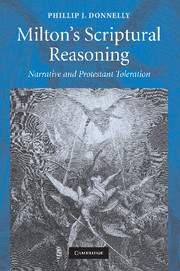Book contents
- Frontmatter
- Contents
- Preface and acknowledgments
- Abbreviations and editions
- 1 Introduction: Scriptural reasoning
- PART I SCRIPTURAL REASONING IN MILTON'S PROSE
- 2 Reason, rhetoric, and educational reading
- 3 Monism and Protestant toleration
- PART II BIBLICIST RHETORIC AND ONTOLOGY IN PARADISE LOST
- PART III BIBLICIST POETICS AND HERMENEUTIC ETHICS
- Notes
- Subject index
- Index of Scripture references
3 - Monism and Protestant toleration
Published online by Cambridge University Press: 04 September 2009
- Frontmatter
- Contents
- Preface and acknowledgments
- Abbreviations and editions
- 1 Introduction: Scriptural reasoning
- PART I SCRIPTURAL REASONING IN MILTON'S PROSE
- 2 Reason, rhetoric, and educational reading
- 3 Monism and Protestant toleration
- PART II BIBLICIST RHETORIC AND ONTOLOGY IN PARADISE LOST
- PART III BIBLICIST POETICS AND HERMENEUTIC ETHICS
- Notes
- Subject index
- Index of Scripture references
Summary
Milton's view of “right reason,” or conscience, provides a key link between his widely acknowledged monism and his arguments for Protestant toleration. As I indicated in Chapter 1, the argument here considers Miltonic “reasoning” under three different aspects. I refer, in one sense, to his “discursive” reasoning, which indicates the relationships among a network of specific claims that Milton engages throughout his writing: claims regarding what is real (ontology), claims about human nature (anthropology), and claims concerning human virtue (ethics) and civil society (politics). In a different sense, developed further in later chapters, I refer to “Christo-poetic” reasoning to indicate the indirect ways that Milton deploys Scripture to intimate how the above network of claims is intrinsic to the form and content of divine self-revelation. The third aspect of Miltonic reasoning that I distinguish might be called “ethico-cognitive,” which indicates action taken by the human faculty of “right reason,” or conscience. This chapter completes our initial heuristic treatment of the evidence in some of Milton's prose for the “discursive” network of claims by continuing to unfold the central place of “right reason” among those claims. “Conscience” is obviously central to Milton's prose arguments for Protestant toleration. We will consistently misconstrue those arguments, however, if we assume that Miltonic conscience participates in a reality that consists entirely of the strife between sheer necessity and randomness.
- Type
- Chapter
- Information
- Milton's Scriptural ReasoningNarrative and Protestant Toleration, pp. 49 - 70Publisher: Cambridge University PressPrint publication year: 2009

